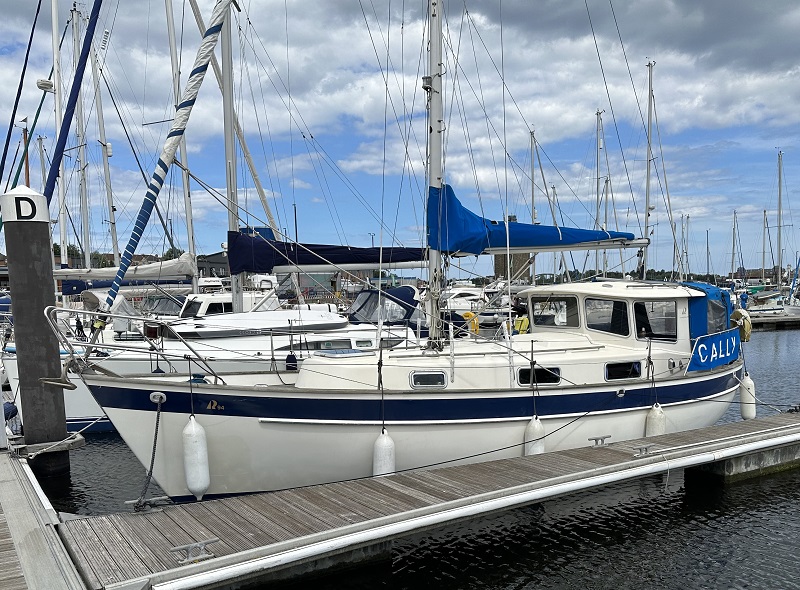Review of Hallberg-Rassy 94 Kutter


Basic specs.

Looking for a new boat? Find a Hallberg-Rassy 94 Kutter or similar boat for sale
The boat is equipped with 4 berths.
The headroom is above average
The Hallberg-Rassy 94 Kutter is equipped with a long keel. A long keel provide a better directional stability than a similar boat with a fin keel; on the other hand, better directional stability means also that the boat is more difficult to handle in a harbour with less space.
The keel is made of iron. Many people prefer lead keel in favour of iron. The main argument is that lead is much heavier than iron and a lead keel can therefore be made smaller which again result in less wet surface, i.e. less drag. In fact iron is quite heavy, just 30% less heavy than lead, so the advantage of a lead keel is often overstated.
The boat can enter even shallow marinas as the draft is just about 1.15 - 1.25 meter (3.77 - 4.07 ft) dependent on the load. See immersion rate below.
Hallberg-Rassy 94 Kutter is typically equipped with an inboard Volvo Penta MD17 diesel engine at 36.0 hp (26 kW), which gives a max speed about 6.9 knots.
The transmission is a shaft drive. A shaft drive will in the long run require less maintenence than other types of drive e.g. a sail drive.
The fuel tank has a capacity of 150.0 liters (39 US gallons, 32 imperial gallons).
Sailing characteristics
This section covers widely used rules of thumb to describe the sailing characteristics. Please note that even though the calculations are correct, the interpretation of the results might not be valid for extreme boats.
What is Capsize Screening Formula (CSF)?
The capsize screening value for Hallberg-Rassy 94 Kutter is 1.89, indicating that this boat could - if evaluated by this formula alone - be accepted to participate in ocean races.
What is Theoretical Maximum Hull Speed?
The theoretical maximal speed of a displacement boat of this length is 7.0 knots. The term "Theoretical Maximum Hull Speed" is widely used even though a boat can sail faster. The term shall be interpreted as above the theoretical speed a great additional power is necessary for a small gain in speed.
The immersion rate is defined as the weight required to sink the boat a certain level.
The immersion rate for Hallberg-Rassy 94 Kutter is about 179 kg/cm, alternatively 1005 lbs/inch.
Meaning: if you load 179 kg cargo on the boat then it will sink 1 cm.
Alternatively, if you load 1005 lbs cargo on the boat it will sink 1 inch.
Sailing statistics
This section is statistical comparison with similar boats of the same category. The basis of the following statistical computations is our unique database with more than 26,000 different boat types and 350,000 data points.
What is Motion Comfort Ratio (MCR)?
The Motion Comfort Ratio for Hallberg-Rassy 94 Kutter is 26.7.
What is L/B (Length Beam Ratio)?
The l/b ratio for Hallberg-Rassy 94 Kutter is 2.89.
The ballast ratio for Hallberg-Rassy 94 Kutter is 35%.
What is Displacement Length Ratio?
The DL-ratio for Hallberg-Rassy 94 Kutter is 258 which categorizes this boat among 'light crusers & offshore racers'.
Maintenance
When buying anti-fouling bottom paint, it's nice to know how much to buy.
The surface of the wet bottom is about 27m2 (290 ft2).
Based on this, your favourite maritime shop can tell you the quantity you need.
Note: If you use a paint roller you will need more paint than if you use a paintbrush.
If you need to renew parts of your running rig and is not quite sure of the dimensions, you may find the estimates computed below useful.
| Usage | Length | Diameter | ||
| Jib sheet | 9.4 m | (30.8 feet) | 12 mm | (1/2 inch) |
| Genoa sheet | 9.4 m | (30.8 feet) | 12 mm | (1/2 inch) |
| Mainsheet | 23.5 m | (77.1 feet) | 12 mm | (1/2 inch) |
| Spinnaker sheet | 20.7 m | (67.8 feet) | 12 mm | (1/2 inch) |
This section shown boat owner's changes, improvements, etc. Here you might find inspiration for your boat.
Do you have changes/improvements you would like to share? Upload a photo and describe what to look for.
We are always looking for new photos. If you can contribute with photos for Hallberg-Rassy 94 Kutter it would be a great help.
If you have any comments to the review, improvement suggestions, or the like, feel free to contact us. Criticism helps us to improve.
